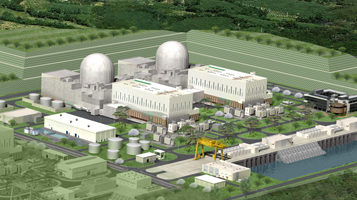The building of two South Korean nuclear reactors stopped suddenly in July 2017, after Moon Jae-in, the country’s left-leaning anti-nuclear president, ordered a pause to the project to give a citizen-jury time to consider its merits. …On October 20, 2017, after the jury endorsed the construction of the two reactors, Shin Kori 5 and 6….Mr Moon had pledged to scrap before he was elected in May. In June, however, he said he wanted to “generate a social consensus” by delegating the final decision to a 471-strong jury picked by a polling company. Its members were given a month to study materials prepared by scientists and activists before debating the project for three days. In the final vote, 60% backed the new reactors, although more than half of them said South Korea should reduce its overall reliance on nuclear energy. Only 10% said the nuclear industry should grow…
Anti-nuclear campaigners have voiced louder concerns since the Fukushima disaster in neighbouring Japan in 2011 and a 5.8 magnitude earthquake last year in the southern city of Gyeongju, close to some of South Korea’s 24 reactors. A corruption scandal in the industry and the revelation in 2012 that some safety certificates for reactor parts were forged amplified their doubts.
But the jury was probably swayed by economic arguments. Korea Hydro and Nuclear Power, the state-run company in charge of the Shin Kori project, claimed it had already spent 1.6trn won ($1.4bn) on the reactors, which were 30% complete. South Korea is the world’s second biggest importer of liquefied natural gas and its fourth largest importer of coal. Hydroelectric and renewable energy provides only 6% of its electricity. So nuclear, which accounts for 27% of its electricity supply, helps to guard against volatile import prices, says Kerry-Anne Shanks of Wood Mackenzie, a consultancy. “Nuclear plants are expensive to build but they’re cheap to run,” she says. The industry also argued that axing the reactors would threaten deals to export nuclear technology…[Owning of nuclear technology makes South Korea a Threshold Nuclear Weapons State.]
Excerpts from Energy in South Korea: People Power, Economist, Oct.28, 2017
